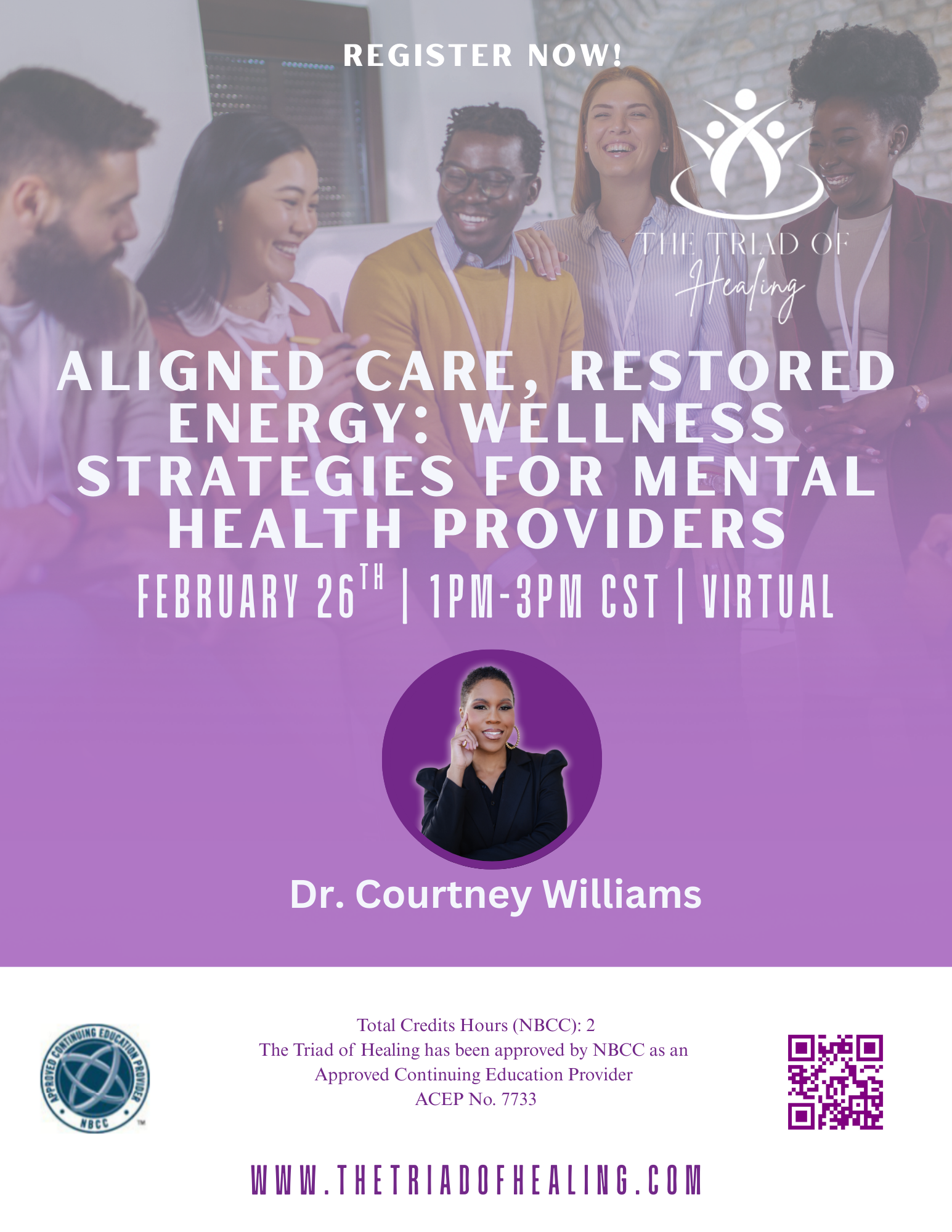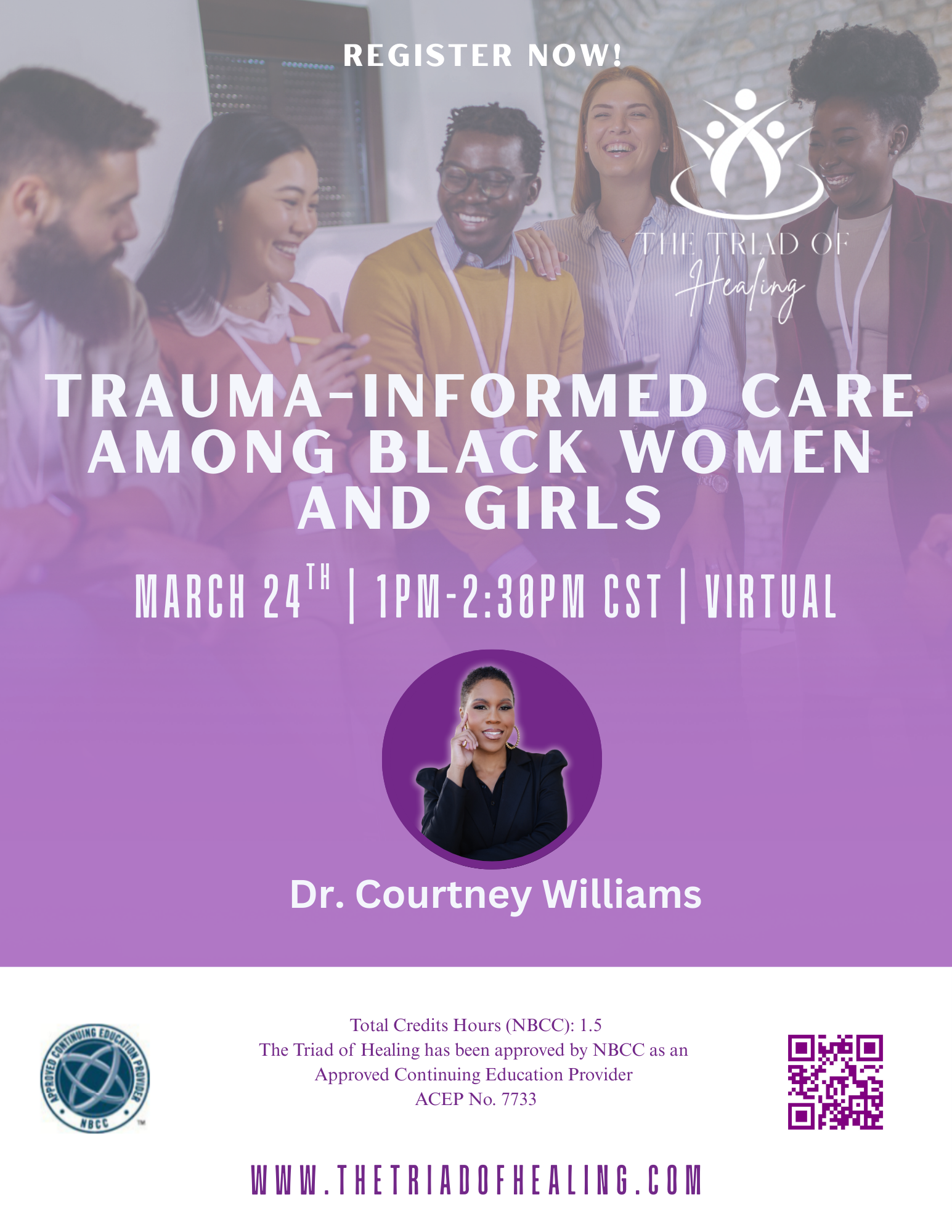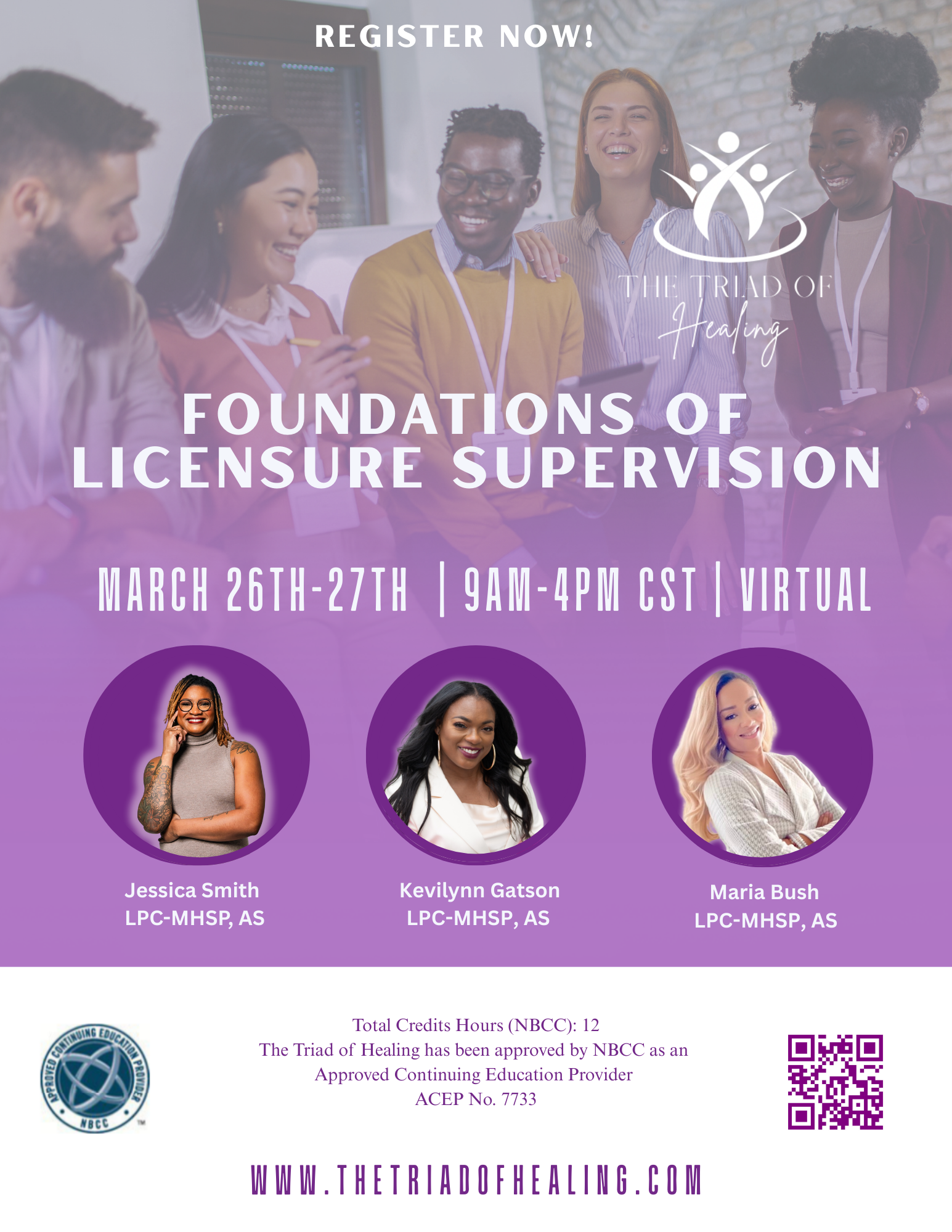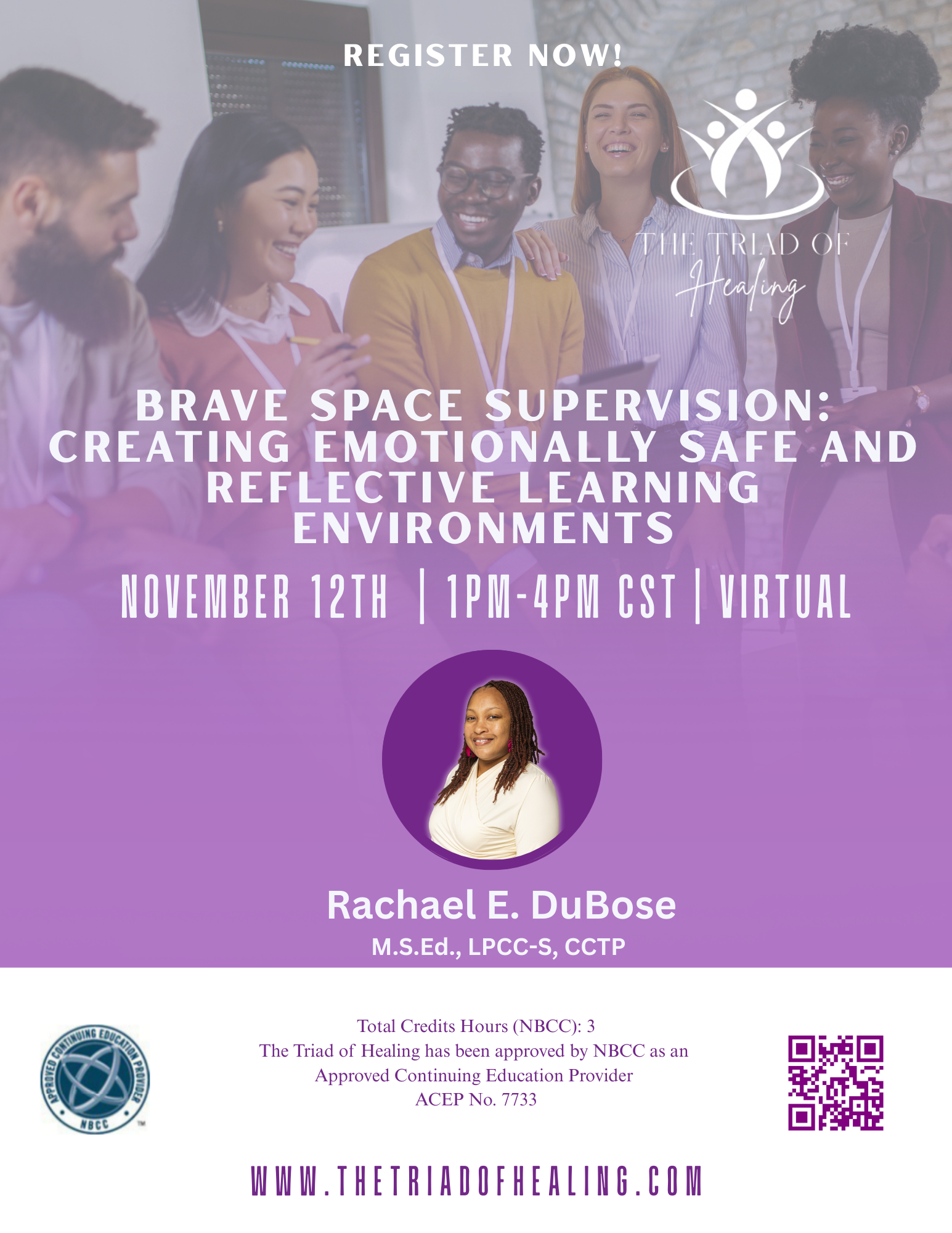
Aligned Care, Restored Energy: Wellness Strategies for Mental Health Providers
Facilitator: Dr. Courtney Williams
2hr CEs (NBCC)
Cost: $100
Rather than framing burnout as a personal failure or a lack of self-care, this session reframes well-being as a professional responsibility and ethical imperative.
Participants explore how misalignment, porous boundaries, and unexamined expectations contribute to depletion and how sustainable care begins with regulation, clarity, and values-based practice.
This training offers tools that go beyond surface-level self-care, focusing instead on nervous system support, boundary-setting as a clinical skill, and energy management that honors both the provider and the work.
Participants will leave with language and frameworks to understand burnout without shame, practical boundary tools applicable in clinical and organizational settings, strategies for regulating stress and restoring energy in real time, and a personalized approach to sustainability aligned with values and capacity.
This workshop is designed for therapists, psychologists, social workers, and helping professionals who want to continue doing meaningful work without sacrificing themselves in the process.

Faith, Fear, and Freedom: A Journey Through Religious Trauma
Facilitator: Logan Golden, LPC-MHSP-TEMP, RTS
2hr CEs (NBCC)
Cost: $100
This training is crucial for mental health professionals, community leaders, and individuals seeking to understand and address the lasting effects of religious trauma. By providing a safe space for dialogue, education, and exploration of healing techniques, participants gain valuable insights that promote personal growth and community healing.
The training fosters resilience and encourages individuals to navigate their faith journeys positively and constructively, ultimately leading to greater well-being and empowerment.
Learning Objectives
1. Define and Identify Religious Trauma: Participants will be able to articulate the concept of religious trauma, recognize its manifestations, and understand its specific impact on individuals, particularly within the Black community.
2. Analyze the Psychological Effects: Participants will gain insight into the psychological implications of religious trauma, including feelings of guilt, shame, and identity conflict, and apply psychoanalytic theories to understand these experiences.
3. Evaluate the Role of Religious Institutions: Participants will critically assess the influence of religious institutions on personal identity and trauma, recognizing how certain teachings and practices may perpetuate negative psychological effects.
4. Implement Healing Strategies: Participants will learn and apply various therapeutic techniques and community support resources aimed at fostering resilience, promoting self-exploration, and empowering individuals to reclaim their identities and overcome the effects of religious trauma

Trauma-Informed Care Among Black Women and Girls
Facilitator: Dr. Courtney Williams
1.5 hr CEs (NBCC)
Cost: $75
Black women and girls face disproportionate exposure to trauma rooted in the intersecting systems of racism, sexism, and economic inequity. Traditional models of trauma-informed care often fail to address the cultural, historical, and gendered realities shaping their experiences. This training bridges that gap by integrating culturally responsive, anti-racist, and feminist frameworks to enhance providers’ understanding and delivery of trauma-informed care. The session is designed to deepen clinicians’ awareness of the social determinants of trauma and equip them with actionable strategies to promote healing, empowerment, and equity in practice.
Learning Objectives By the end of this training, participants will be able to:
1. Identify historical and systemic factors that contribute to trauma among Black women and girls.
2. Describe how trauma manifests physiologically, psychologically, and relationally within this population.
3. Apply principles of trauma-informed care through a culturally responsive and intersectional lens.
4. Implement clinical and community-based strategies that promote safety, empowerment, and healing for Black women and girls.


Hidden in Plain Sight: An Intersectional Approach to Stalking & Sexual Violence for Survivors Within Marginalized Communities
Facilitator: Leah Forney
2hr CEs (NBCC)
Cost: $100
This training provides a comprehensive, intersectional exploration of stalking and sexual violence, focusing on survivors from marginalized communities. Participants will learn to identify patterns and warning signs of stalking, including how stalking behaviors may manifest differently depending on cultural, racial, gender, and socioeconomic contexts. The session examines the intersection of stalking and sexual violence, highlighting the unique barriers and challenges survivors face before, during, and after seeking services. Participants will gain trauma-informed, culturally responsive strategies to support survivors safely and effectively, along with practical tools, frameworks, and actionable steps that can be implemented in direct service, organizational policy, and community-based interventions. Through discussion, case examples, and interactive exercises, attendees will leave empowered to enhance their practice and better serve survivors from diverse backgrounds.
Learning Objectives
Recognize patterns and warning signs of stalking, including how behaviors may present differently in marginalized communities.
Explore the intersection of stalking and sexual violence, understanding the unique challenges survivors face before, during, and after seeking services.
Learn trauma-informed and culturally responsive strategies to support survivors safely, effectively, and empathetically.
Gain practical tools, frameworks, and actionable steps to implement in your work with survivors, organizations, or community settings.

Softening Up by Writing it Down: The Power of Expressive Arts Therapy in Supporting Black Women in Embracing Their Emotions
Facilitator: Chalice Nelson, LPC, NCC, CPCS
3hr CEs (NBCC)
Cost: $150
This presentation introduces how transformative the use expressive arts therapy can be in fostering emotional expression and enhancing mental wellness among Black women. Historically, Black women have navigated a complex interplay of traumas and societal expectations, which has contributed to them being in a space of survival that leads to cognitive dissonance and dissociation. This presentation will correlate how these historical and societal factors have impacted their mental health.
Learning Objectives
Define the historical traumas and societal norms/expectations Black women experience that contribute to cognitive dissonance and dissociation.
Identify the processes within Expressive Arts Therapy which can support Black women in building awareness and increase emotional expression.
Implement use of 2 expressive arts therapy techniques that can be utilized to enhance the mental wellness of Black women.

Wellness in the Workday
Facilitator: Jessica Smith, LPC-MHSP, AS
1hr CE (NBCC)
Cost: Free
A welcoming space designed exclusively for mental health clinicians to connect, learn, and recharge. Share insights, reflect, and discover strategies to enhance your well-being and professional growth. Let’s prioritize wellness together!
Together, we can nurture ourselves while making a difference in others’ lives. Don’t miss out—see you there!
Learning Objectives:
1. Increase Awareness of Self-Care Strategies and Organizational Resources
Participants will identify at least three effective self-care practices and organizational support resources to maintain personal well-being and prevent burnout in their professional roles.
2. Enhance Understanding of the Impact of Workplace Culture on Therapist Wellness
Participants will analyze how organizational policies and peer support systems influence mental health professionals' resilience and job satisfaction, fostering a culture of wellness.
3. Develop Actionable Steps to Promote a Supportive Work Environment
Participants will design and share at least one initiative or policy idea aimed at promoting a supportive and healthy work environment within their organization.

When the Body Remembers: Trauma, Chronic Illness, and the Power of Collaborative Care
Facilitator: Dr. Ronya Green, MD, MPH, MBA
2Hr CEs (NBCC)
Cost: $100
Unresolved trauma doesn’t just live in the mind—it shapes the body. This engaging training explores the powerful link between trauma histories and autoimmune conditions, with a focus on culturally responsive, whole person care. Designed for LPCs, LCSWs, and other mental health professionals, this session offers practical tools to strengthen collaboration with primary care providers, empower client wellness, and expand trauma-informed practice.
Learning Objectives
Describe the relationship between trauma exposure and the onset/exacerbation of autoimmune conditions.
Identify culturally responsive approaches to discussing physical health concerns with clients in ways that honor their lived experiences.
Demonstrate strategies for collaboration with primary care providers to optimize wellness outcomes for clients with chronic health conditions.
Apply whole person care principles to therapeutic practice with clients managing both trauma histories and physical health challenges.

Cycles of Care: Menstruation, Mental Health, and Healing
Facilitators: Jasmine Price, LPC-S, LPC
3 Hr CEs (NBCC)
Cost: $150
Menstrual cycles are often reduced to medical or pathological narratives, especially for Black, Brown, and Indigenous women. This workshop reframes the menstrual cycle as a site of memory, emotional release, and ancestral connection, offering pathways to healing intergenerational trauma and rebuilding trust in the body. Participants will explore how menstrual disconnection—rooted in shame, systemic oppression, and family silencing—can be reclaimed as a deeply embodied therapeutic process. Through storytelling, psychoeducation, and practical tools, attendees will learn trauma-informed and culturally grounded strategies to support menstrual reconnection. This training is designed for therapists, birthworkers, educators, and community leaders seeking to expand trauma healing beyond cognition into ceremony, rhythm, and lineage.
Learning Objectives
Identify ways menstrual shame and generational disconnection contribute to mental health challenges in marginalized communities.
Describe how cycle education supports emotional awareness and intergenerational healing, including at least one strategy for engaging caregivers and youth.
Demonstrate understanding of trauma-informed approaches to reintroducing menstrual wellness—such as cycle tracking or emotional mapping—in therapeutic or community-based settings.

Messy, Painful, Necessary: Collective Healing Beyond the Therapy Room
Facilitators: Danielle McDowell, LPC
Location: Virtual
2 Hr CEs (NBCC)
Cost: $100
Trauma lives in bodies, families, communities, institutions, and cultural memory. Yet trauma-informed care is too often confined to treatment plans and clinical settings. This workshop reimagines healing beyond the therapy room, engaging in the collective, often difficult, work of transformation. Led by Licensed Professional Counselor, TEDx speaker, and women’s coach Danielle L. McDowell, this session expands trauma-informed care through a culturally responsive, identity-centered lens. Drawing on community healing circles, expressive arts, and racial justice consulting, Danielle highlights liberatory and embodied practices rooted in Black and Brown traditions of collective care. Participants will learn to integrate creative, somatic, and relational practices with individuals, couples, and groups, centering humanity—not pathology—in trauma responses. This training supports clinicians, community organizers, educators, and healing practitioners in holding space for grief, resistance, and renewal, while honoring resilience grounded in presence, connection, and radical honesty.
Learning Objectives
By the end of this webinar, participants will be able to: Identify and describe at least three collective or community-based healing practices that support trauma recovery beyond traditional therapy settings.
Apply culturally responsive, identity-centered strategies when working with clients from historically marginalized communities experiencing trauma.
Analyze the limitations of individual-focused trauma treatment models and develop a plan to incorporate somatic, expressive, or relational modalities into current clinical or community-based practice.

Brave Space Supervision: Creating Emotionally Safe and Reflective Learning Environments
Facilitators: Rachael DuBose
Location: Virtual
3 Hr CEs (NBCC)
Cost: $150
Supervision is more than compliance—it is a sacred space for reflection, resilience-building, and human connection. Brave Space Supervision is a trauma-informed, culturally responsive model designed to foster emotionally safe learning environments for clinicians and trainees. As trauma-informed care expands across systems, supervisory practices must also evolve by centering humanity, relational safety, and critical consciousness in every interaction. In this training, participants will explore core principles of trauma-informed supervision—safety, trust, choice, collaboration, and empowerment—and examine how these principles intersect with culturally affirming and relational models. Attention will be given to the impact of rupture and repair, power dynamics, emotional labor, and cultural identity in shaping supervisory relationships. Through real-world examples and reflective dyads, attendees will learn strategies to hold space with intention, attune to unspoken wounds, and cultivate resilience within the supervisory process.
Learning Objectives
By the end of this webinar, participants will be able to: Define emotional safety in the context of clinical supervision and identify its key components.
Examine how cultural identity, power dynamics, and trauma histories shape the supervision experience.
Apply trauma-informed, relational, and culturally responsive strategies to enhance emotional safety for supervisees.

Whole Families, Whole Healing: Healing Justice-Involved Families Through Trauma-Informed Support
Facilitators: Alexis Lacy
Location: Virtual
1.5 Hr CEs (NBCC)
Cost: $75
This presentation explores the need for trauma-informed, identity-aware approaches to supporting families that are justice involved —particularly Black families disproportionately affected by the justice system. Incarceration is a traumatic experience for both the individual and their family creating long-lasting impacts. These impacts are further compounded by race-based, gendered, and systemic trauma, making trauma informed and culturally relevant support essential for long-term successful outcomes. Participants will gain insight into how practitioners can shift their approach to center healing, dignity, and cultural relevance. We will share methods and practical tools that empower families and communities to advocate for their loved ones during and after incarceration—especially those living with behavioral health challenges. The session will also highlight the role of community-led strategies in promoting long-term wellness and successful reentry. From peer support networks and reentry navigators to the radical power of rest and community care, we will examine how these collective, trauma-informed efforts foster generational healing.
Objectives:
1. Highlighting the need for trauma-informed and identity-aware healing approaches for practitioners. Examine how incarceration impacts Black families across generations, and why trauma-informed, culturally grounded approaches are essential for addressing the unique experiences of race-based, gendered, and systemic trauma during and after incarceration.
2. Sharing methods for empowering families and communities with tools for advocacy and navigation both during and after incarceration for long-term healing. Provide families and support networks with practical knowledge and tools to navigate the justice system, advocate for loved ones—especially those with behavioral health needs—and maintain critical connections that support long-term healing and restoration.
3. Promoting community-led, sustainable reentry, and wellness models that lead to successful reentry outcomes and generational healing. Emphasize the power of peer support, reentry navigators, community care, and rest as resistance in promoting wellness. Explore how collective care, informed by trauma and cultural context, creates conditions for successful reentry and generational healing.

Soul Care: Considerations & Wellness-Centered Strategies for Clinicians of Color
Facilitators: Dr. PaQuita Pullen
1.5 Hr CEs (NBCC)
Cost: $75
Clinicians of Color are faced with unique challenges such as discrimination,marginalization, and exclusion. These experiences are being managed inaddition to their clinical work as mental health professionals and healers. Many of these experiences are limited or avoided altogether in traditionalconversations on self-care, leaving Clinicians of Color vulnerable to psychological distress such as burnout.
Engaging in decolonized practices that support the well-being for BIPOC clinicians is essential for two key reasons: retention and adherence to ethical practices. Absenteeism is a potential negative consequence of burnout which poses as a problem because Clinicians of Color can improve access and care for BIPOCindividuals, are more likely to engage in research relevant to BIPOC populations, and are more likely to facilitate multicultural competentconversations. Furthermore, Clinicians of Color have an ethical responsibility to monitor themselves for impairment as identified in the ACACode of Ethics.
This presentation seeks to examine 2-3 stressors specific to BIPOC clinicians along with effective and culturally congruent strategies to address them. This presentation will be experiential and dynamic in nature! Reserve Your Seat
Recognizing Microaggressions in Professional Settings and Embracing Cultural Awareness
Facilitators: Dr. Jaylynne Likely
Location: Virtual
2 Hr CEs (NBCC)
Cost: $100
Explore how microaggressions, macroaggressions, and implicit bias affect both client outcomes and the well-being of practitioners. This session provides audience members with tools to identify harmful interactions, understand the impact, and adopt culturally aware practices that disrupt bias, foster inclusive environments, and support healing across diverse communities
Objectives:
1. Define and differentiate types of microaggressions
2. Demonstrate increased cultural awareness and sensitivity by analyzing case studies and applying the principle of cultural humilty to respond to microaggressions that supports social work code of ethics
3. Apply evidence informed strategies to promote inclusivity in professional settings. Learners will develop techniques for self-reflection, active listening and interrupting bias while maintaining professional boundaries.

Understanding Grief and Bereavement in Mental Health Counseling
Facilitators: Christal Pennic and Felipe Blue
3 Hr CEs (NBCC)
Cost: $150
Grief and bereavement are multifaceted processes that extend beyond sadness, encompassing psychological, emotional, physical, spiritual, and cultural dimensions. While grief is a universal human experience, each client’s journey is unique and influenced by personal history, family systems, culture, and the nature of the loss.
This training equips mental health counselors with knowledge and skills to navigate the complexities of grief support. Participants will gain clarity on the distinctions between grief, mourning, and bereavement, while also exploring how to differentiate typical grief responses from complicated or prolonged grief. Emphasis will be placed on culturally responsive care, lifespan considerations, and evidence-based interventions.
Counselors will also reflect on their own experiences of grief, learning strategies to build resilience and prevent burnout when working with grieving clients.


You’re a Licensure Supervisor..Now What?
Join us on May 12th from 9AM–12PM (CST) for a virtual training designed just for newly credentialed licensure supervisors who are ready to launch their supervision services with confidence and clarity!
Whether you’re just getting started or looking to fulfill your 3-hour Tennessee renewal requirement, this training is packed with practical tools, structure, and guidance to help you scale your services and lead the next generation of clinicians.
Led by powerhouse trainers Maria, Kevilynn, and Jessica, this session will be equal parts insightful, energizing, and empowering.
Hosted by Triad of Healing — where growth meets guidance.


